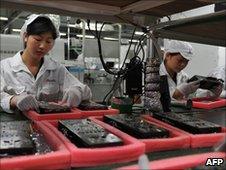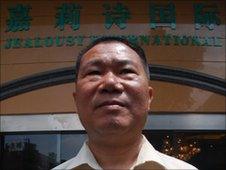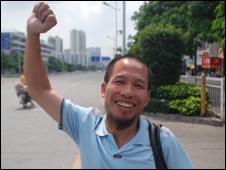Is the era of cheap Chinese labour almost over?
- Published

Foxconn's Chinese workers have had a pay rise
A string of suicides at the Foxconn plant in southern China that makes iPads and iPhones for Apple has focused attention on wages and conditions there.
Now the Taiwanese company has said it will more than double the wages of staff by October.
The announcement follows a double-digit pay increase for workers at some of the factories that supply Honda in China following their industrial action.
Some say these stories show there is a limit to what Chinese workers are willing to put up with these days, and that the era of cheap labour in China is coming to an end. But are they right?
'Keep you busy'
In the southern Chinese city of Shenzhen, as the sun goes down, the army of youths that staff its factories come out onto the streets.
Everything's cheap here. Few migrant workers have money to spare for anything but essentials.
It's easy for the rest of us not to think too often about what the Chinese who make much of what we wear, and what we use at home and at work, endure.
But the suicides at the electronics manufacturer Foxconn changed all that.
In a shabby restaurant in the suburbs, a young man in a Foxconn uniform who along with all his colleagues has just been given a 30% pay increase, with a promise of a further 70% to come, agrees to talk about his employer.
It's not the pay rise he wants to talk about. It is conditions at the plant.
"All they do is keep you busy," he complains. "They insult you if aren't working fast enough, or if you pause when there's nothing to do."
"The work is tiring," he says, "the breaks are always late - anything from ten minutes to an hour."
Foxconn raised its wages to try to ease the pressure on its workers, to lessen the need for them to do overtime in order to make enough take home pay.
It's a costly move. Analysts believe the 30% hike alone will reduce company earnings by a fifth this year.
'Like a family'
A couple of hour's drive from the Foxconn plant is the main production base of lingerie firm Jealousy International.

David He says wages will not have to rise across the board
Officials there say they are one of 40 lingerie firms in the city of Foshan.
They might make very different products to Foxconn, but they compete with them for a shrinking pool of young workers.
But the factory's owner, David He, dismisses the idea that big pay rises at firms like Foxconn will force up wages in the area.
"The very fact that Foxconn needs to raise wages by 70% to stabilise its workforce, shows how low paid the workers were there," he says.
"Our company's goal is to help ensure that staff develop new skills. If they are happy and they agree with management, we will be like in a family and no-one will want to leave."
Human beings
Labour activist Xiao Qing Shan welcomes Foxconn's move to pay its workers more, but warns that unless it treats its staff better the gains will be superficial.

Xiao Qing Shan insists working conditions also need to improve
"They're human beings. They don't just need more money. They need human rights," he says.
"They need their dignity. They demand to be treated fairly."
Foxconn's response to that is robust.
In a statement it told the BBC the company is working diligently to ensure that support programmes meet the rapidly changing needs of its employees.
On the issue of what's causing the suicides, the firm still doesn't have a definitive answer.
"We are working on many fronts to address this complex and highly sensitive matter," it says.
The labour activist Xiao Qing Shan says there is another issue that's been ignored by much of the local and international media.
What he sees as most unfair is that while the double digit increases for the largely youthful workforce at big companies like Foxconn make headlines, millions of other workers are getting left behind.
'No pay rise'
On the roof of their cramped house, Wang Si Chun and his wife are on their hands and knees sorting out rubbish to sell.

Wang Si Chun says low wages will remain for many
He's as old as communist China. He was born two months after Chairman Mao started the People's Republic. For the last few years the only job he could find was cleaning the streets.
He scoffs at the suggestion that the era of cheap labour is over.
"People like street cleaners, our wages haven't really risen," he says.
"Our bosses will never give up their profits to fund a pay increase. Our pay hasn't changed. There's no sign of a pay rise."
Wages here have a long way to increase before they reach the levels of those in other emerging economies. China's pay packets are on average still just a quarter of the size of those in Brazil for example.
Higher wages should encourage people here to save a little less, to spend a little more, which is good for the economy.
But they could feed the suspicion many poorer Chinese have that this is becoming a more unfair, less equal society.
- Published9 June 2010
- Published9 June 2010
- Published7 June 2010
- Published26 May 2010